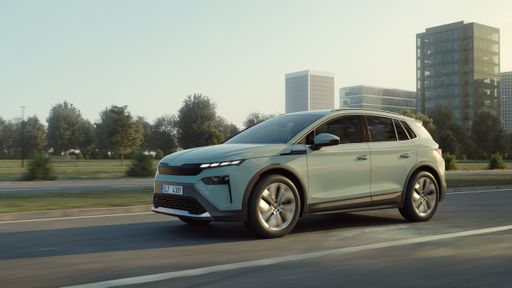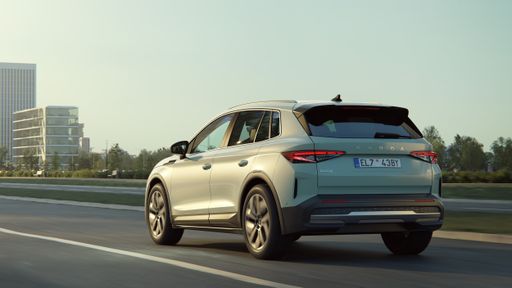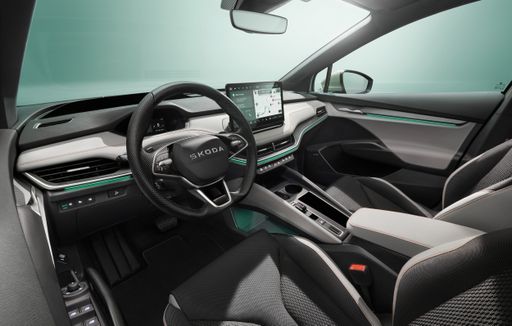Hyundai Kona VS Skoda Elroq
In the competitive subcompact SUV segment, the Hyundai Kona and Skoda Elroq stand out with their distinct design and performance capabilities. The Kona impresses with its dynamic styling and tech-forward interior, appealing to younger buyers, while the Elroq offers a spacious cabin and practical features that cater to families. Both models deliver excellent efficiency, but the choice between them ultimately hinges on personal preference for aesthetics and utility.
Hyundai Kona
The Hyundai Kona blends a bold design with a versatile interior, making it a standout choice in the compact SUV market. Its crisp handling and responsive steering provide an engaging driving experience, whether in the city or on the open road. The vehicle also offers a range of features designed to enhance comfort and connectivity, ensuring a pleasurable journey for both driver and passengers.
detailsSkoda Elroq
The Elroq stands out in the automotive world with its striking design and a bold presence on the road. Boasting an interior that balances luxury and functionality, it provides an engaging driving experience for enthusiasts and casual drivers alike. With its innovative features and attention to detail, the Elroq redefines what consumers can expect from modern automobiles.
detailsHyundai Kona vs. Skoda Elroq: A Comprehensive Comparison
The automotive landscape continues to evolve, especially with the increasing popularity of SUV models that combine utility and style. In this midst, two strong contenders, the Hyundai Kona and Skoda Elroq, have emerged, captivating the attention of consumers worldwide. This article dives into a detailed comparison of these two vehicles, highlighting their technical aspects, innovations, and overall appeal in the market.
Performance and Powertrains
The 2024 Hyundai Kona offers a range of powertrains including petrol, hybrid, and electric options. The petrol variants deliver power outputs ranging from 100 to 170 HP, and the full hybrid and electric models can achieve up to 218 HP. Notably, the Kona’s electric range is impressive, with capabilities of up to 514 km on a single charge, supported by battery capacities of 48.4 kWh and 65.4 kWh for the respective models.
On the other hand, the 2025 Skoda Elroq is solely electric, presenting a robust choice with two main power outputs: 170 HP and a striking 285 HP in its higher variant. With a maximum electric range of 580 km, it holds an edge for long-distance travel, thanks to its larger battery capacity options of 52 kWh and 77 kWh. Acceleration is swift for the Elroq, with the ability to sprint from 0 to 100 km/h in just 6.6 seconds.
Design and Dimensions
When comparing dimensions, the Kona comes in at 4,350 mm in length, 1,825 mm in width, and 1,585 mm in height, making it slightly more compact than the Elroq. The Skoda Elroq measures 4,488 mm long, 1,884 mm wide, and 1,625 mm tall. This gives the Elroq a more substantial road presence and sense of space, both inside and out. Additionally, the trunk capacity for the Elroq is slightly greater at 470 L compared to the Kona's 466 L, providing more room for luggage and gear.
Interior Comfort and Technology
Both SUVs boast modern interiors equipped with advanced technology, but they appeal to different user preferences. The Kona emphasizes a user-friendly interface, with infotainment systems that include support for Apple CarPlay and Android Auto, intuitive controls, and quality materials throughout.
The Elroq, meanwhile, takes a more minimalist approach with a focus on sustainability and functionality. Its infotainment system is seamlessly integrated into the design, outfitted with upgraded graphics and the newest in-car connectivity features. Both vehicles comfortably seat five passengers, yet the Elroq may offer slightly more legroom due to its larger dimensions.
Driving Experience
On the road, the Hyundai Kona performs admirably, with options for either front-wheel or all-wheel drive, catering to diverse driving conditions. Its 0 to 100 km/h acceleration stands at a respectable 7.8 seconds in the top electric variant. Fuel consumption varies across models, achieving efficiency levels from as low as 4.5 L/100 km up to 6.7 L/100 km for petrol engines.
In contrast, the Skoda Elroq's electric powertrain provides immediate torque, resulting in a smooth and agile driving experience. The rear-wheel drive configuration contributes to a dynamic handling characteristic, making it enjoyable to drive in various road conditions. Although its top speed maxes out at 180 km/h, the emphasis is firmly on efficiency with a consumption range of 15.2 to 16.4 kWh/100 km.
Safety and Innovations
Both the Hyundai Kona and Skoda Elroq have received high ratings in safety, equipped with a suite of advanced driver-assistance systems. The Kona includes features such as lane-keeping assist, blind-spot monitoring, and adaptive cruise control, enhancing the overall safety profile of the vehicle.
The Elroq, leveraging Skoda's prowess in engineering, comes with cutting-edge innovations such as automatic emergency braking and a comprehensive suite of adaptive systems designed to ease the driving experience. Additionally, both models are compliant with the latest environmental regulations, with the Elroq boasting an impressive CO2 efficiency class of A due to its all-electric status.
Conclusion
In conclusion, the choice between the Hyundai Kona and Skoda Elroq ultimately boils down to personal preferences and priorities. The Kona offers versatility with its diverse powertrain options and compact dimensions, appealing to consumers seeking a well-rounded SUV. Alternatively, the Skoda Elroq stands out with its cutting-edge electric technology, impressive range, and spacious interior, ideal for those looking to embrace the future of driving.
Whichever option you choose, both vehicles promise an engaging driving experience, advanced technology, and comfort that cater to the needs of modern drivers.
 @ hyundai.news
@ hyundai.news
 @ hyundai.news
@ hyundai.news
 @ hyundai.news
@ hyundai.news
 @ hyundai.news
@ hyundai.news
 @ skoda-storyboard.com
@ skoda-storyboard.com
 @ skoda-storyboard.com
@ skoda-storyboard.com
 @ skoda-storyboard.com
@ skoda-storyboard.com

|

|
|
|
|
Costs and Consumption |
|
|---|---|
|
Price
about 24400 - 44800
$
|
Price
about 31300 - 50500
$
|
|
Consumption L/100km
4.5 - 6.7
L
|
Consumption L/100km
-
|
|
Consumption kWh/100km
14.6 - 16.8
kWh
|
Consumption kWh/100km
15.2 - 16.4
kWh
|
|
Electric Range
377 - 514
km
|
Electric Range
375 - 580
km
|
|
Battery Capacity
1.3 - 65.4
kWh
|
Battery Capacity
52 - 77
kWh
|
|
co2
128, 103, 141, 152, 0
g/km
|
co2
0
g/km
|
|
Fuel tank capacity
38 - 47
L
|
Fuel tank capacity
-
|
Dimensions and Body |
|
|
Body Type
SUV
|
Body Type
SUV
|
|
Seats
5
|
Seats
5
|
|
Doors
5
|
Doors
5
|
|
Curb weight
1370 - 1773
kg
|
Curb weight
1949 - 2119
kg
|
|
Trunk capacity
466
L
|
Trunk capacity
470
L
|
|
Length
4350 - 4385
mm
|
Length
4488
mm
|
|
Width
1825
mm
|
Width
1884
mm
|
|
Height
1580 - 1585
mm
|
Height
1625
mm
|
|
Payload
420 - 490
kg
|
Payload
478 - 531
kg
|
Engine and Performance |
|
|
Engine Type
Petrol, Full Hybrid, Electric
|
Engine Type
Electric
|
|
Transmission
Manuel, Automatic
|
Transmission
Automatic
|
|
Transmission Detail
Manual Gearbox, Automat. Schaltgetriebe (Doppelkupplung), Reduction Gearbox
|
Transmission Detail
Reduction Gearbox
|
|
Drive Type
Front-Wheel Drive, All-Wheel Drive
|
Drive Type
Rear-Wheel Drive
|
|
Power HP
100 - 218
HP
|
Power HP
170 - 285
HP
|
|
Acceleration 0-100km/h
7.8 - 13.3
s
|
Acceleration 0-100km/h
6.6 - 9
s
|
|
Max Speed
162 - 208
km/h
|
Max Speed
160 - 180
km/h
|
|
Torque
200 - 265
Nm
|
Torque
310 - 545
Nm
|
|
Number of Cylinders
3 - 4
|
Number of Cylinders
-
|
|
Power kW
74 - 160
kW
|
Power kW
125 - 210
kW
|
|
Engine capacity
998 - 1598
cm3
|
Engine capacity
-
|
|
Top speed
162 - 208
km/h
|
Top speed
160 - 180
km/h
|
General |
|
|
Model Year
2024
|
Model Year
2025
|
|
CO2 Efficiency Class
D, C, E, A
|
CO2 Efficiency Class
A
|
|
Brand
Hyundai
|
Brand
Skoda
|
Hyundai Kona
The Hyundai Kona: A Comprehensive Overview
The Hyundai Kona has established itself as a standout in the compact SUV segment, blending innovation with performance and style. As the automotive world moves towards more sustainable and efficient options, the Kona offers a variety of powertrains, from traditional petrol engines to full hybrids and all-electric models.
Powertrain Options and Performance
The Hyundai Kona's powertrain choices cater to a wide range of preferences. For petrol enthusiasts, the Kona offers a 1.0L T-GDI engine, delivering 100 PS, and a more robust 1.6L T-GDI variant with up to 170 PS. Those looking for efficiency without sacrificing power can consider the full hybrid model, offering 129 PS and an impressive consumption of 4.5 L/100km.
For a greener option, the all-electric Kona provides a compelling case. With battery capacities of up to 65.4 kWh, the electric Kona offers power outputs of 156 to 218 PS, and efficiencies as low as 14.6 kWh/100km, enabling an electric range of up to 513 km.
Technical Specifications and Innovations
Built on a robust platform, the Kona delivers versatility and reliability. With a choice between manual or dual-clutch automatic gearboxes, along with options for front-wheel or all-wheel drive, the Kona ensures a tailored driving experience. The handling is enhanced by the car's lightweight construction, balancing a 1370 to 1773 kg curb weight with dynamic performance.
The Kona's design doesn't compromise cargo space for style; it offers a generous 466 L boot capacity. With a relatively compact body, measuring 4350 to 4385 mm in length, the Kona easily navigates urban environments while still commanding a strong road presence with its 1825 mm width.
Efficiency and Eco-Friendliness
Hyundai is committed to reducing emissions, as evidenced by the Kona's CO2 efficiency ratings, which range from class A for electric models to class D for some higher-performance petrol variants. The focus on reducing environmental impact without sacrificing driving pleasure is notable throughout the Kona range.
Costing and Value
The Hyundai Kona offers commendable value for money. Pricing starts at €26,400 and reaches up to €50,690, depending on the chosen configuration. The monthly running costs range from €956 to €1090, with a cost per kilometre of 38.3 to 43.6 cents, making it a competitive option in its class.
Conclusion: Modern, Efficient, and Versatile
The Hyundai Kona stands as a testament to Hyundai's commitment to innovation, efficiency, and practicality. Whether you are inclined towards a traditional combustion engine, a hybrid for a balance of power and efficiency, or a full electric model for maximum eco-friendliness, the Kona provides a tailored solution for each unique driver preference.
Skoda Elroq
Introduction to the Skoda Elroq: The Future of Electric SUVs
As the automotive industry shifts towards sustainable technologies, the Skoda Elroq emerges as a compelling addition to the electric vehicle (EV) market. This pioneering electric SUV combines innovative engineering, impressive performance, and an eco-friendly design, making it a strong contender in its segment. With its striking exterior and advanced technology, the Elroq is set to redefine the driving experience in the electric SUV category.
Powertrains and Performance: A Closer Look
The Skoda Elroq is available in multiple configurations, featuring two distinct power options that highlight electric mobility's potential. The Elroq 50 variant is equipped with a 170 HP electric motor, offering a smooth and responsive ride. With a consumption rate of 15.8 kWh/100 km and a range of up to 375 km, this model is perfect for daily commuting and urban driving.
For those seeking enhanced performance, the Elroq 85 delivers an impressive 285 HP, available with two battery variations: one with a capacity of 77 kWh and another at 52 kWh. This allows for a range of up to 580 km and 546 km, respectively, significantly extending the driving range for longer journeys. The acceleration from 0-100 km/h takes just 6.6 seconds, ensuring that the Elroq is not just efficient but also thrilling to drive.
Innovative Technology and Features
The Skoda Elroq does not just excel in performance; it is equipped with several innovative technological features designed to enhance the driving experience. With an automatic transmission and rear-wheel-drive setup, the Elroq offers a dynamic driving experience that emphasizes both agility and control.
The vehicle boasts a maximum speed of either 160 km/h or 180 km/h, reported on its higher trims. This performance is complemented by advanced safety systems and driver assistance technologies that seamlessly integrate into the driving experience. The Elroq is designed with a spacious interior, accommodating up to five passengers comfortably, while a trunk capacity of 470 liters ensures ample storage for all your needs.
Design and Ergonomics: A Stylish SUV
From its sleek exterior design to its well-appointed interior, the Skoda Elroq is as much a visual statement as it is a functional vehicle. The dimensions of 4488 mm in length, 1884 mm in width, and a height of 1625 mm give the Elroq a robust and commanding presence on the road. Its aerodynamic lines not only enhance aesthetics but also contribute to improved efficiency.
The interior features generous space, high-quality materials, and an intuitive layout that prioritizes driver engagement. The vehicle is available in two trim levels, Tour and First Edition, each offering unique configurations and luxury touches to match different tastes and preferences.
Environmental Impact: A Step Towards Sustainability
With the rise of environmental consciousness, the Skoda Elroq stands out with its zero CO2 emissions, classified under the efficiency class A. This makes it an appealing option for eco-aware consumers looking to reduce their carbon footprint without sacrificing performance or comfort. The design and technology employed in the Skoda Elroq reflect a commitment to sustainability, making it a responsible choice in the modern automotive landscape.
Conclusion: The Skoda Elroq in a Nutshell
The Skoda Elroq represents an exciting evolution in the world of electric SUVs. With its potent powertrains, innovative technology, and commitment to sustainability, this vehicle is not just about getting from point A to point B—it is about thriving in a future where electric mobility takes center stage. Whether you're navigating city streets or embarking on outdoor adventures, the Elroq is ready to elevate your driving experience to new heights.
With starting prices ranging from €33,900 to €54,610, the Elroq provides an attractive option for anyone seeking a blend of performance, luxury, and environmental responsibility.
